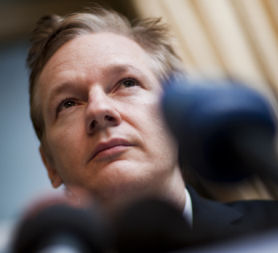US braced for fresh WikiLeaks release
Government are bracing themselves for the latest batch of classified documents by WikiLeaks. Former diplomat Carne Ross tells Channel 4 News there is a need for more responsible accountability.
The files, expected to be released in the next few days, are supposed to be seven times larger than the files published by teh whistle-blowing website WikiLeaks in October on the Iraq war, which was then the largest classified military leak in history. The US has been briefing allies on the possible content of the new documents.
It is thought the leaked documents will include reports from officials in Washington and diplomatic posts around the world. Many fear these diplomatic cables will embarrass the United States and its allies about the way they conduct international relations.
The State Department in Washington called the leak of the documents “irresponsible”, warning that it could put lives at risk.
“One of the problems with the WikiLeaks approach is that this vast amount of information is released and we don’t really know what effect that will have.”
Former British diplomat Carne Ross
Downing Street said British officials had been briefed on the likely content of the documents by the US ambassador, Louis Susman, but the Prime Minister’s spokesman said: “I don’t want to speculate about precisely what is going to be leaked before it is leaked.”
“We are all bracing for what may be coming and condemn WikiLeaks for the release of classified material,” State Department spokesman PJ Crowley said. “It will place lives and interests at risk. It is irresponsible.”
He warned that publication of the documents could erode trust in the US as a diplomatic partner. “When this confidence is betrayed and ends up on the front pages of newspapers or lead stories on television or radio, it has an impact,” he said.

Former British diplomat Carne Ross, who resigned from the Foreign Office over the invasion of Iraq, told Channel 4 News that we do not know what the impact documents will be until they are released.
“I think it’s really unclear, both for the State Department and indeed for Julian Assange and WikiLeaks, to say one way or the other that they’re dangerous or they’re not dangerous. These things have a particular effect. When information comes out it will have an effect which perhaps nobody can really predict.
“I think these telegrams are written, certainly in the British Foreign Office, on the understanding that they won’t be public. So, ambassadors and officials say things that are really very candid in them that you would not find ministers admitting publicly.
“If these document come out, if there is a culture that documents like this will be leaked in future, I think that diplomats and officials will stop writing these kinds of things down. That will have negative consequences for the operational effectiveness of government.
He said he was never held accountable for his work as a diplomat through parliament, and thought diplomacy could be a “great deal more transparent than it actually is”.
“Perhaps there are things that have to remain secret between States, but I think this whole sense that States have business that we don’t need to know about, that we should not know about, that it’s too serious for the general public to be aware of is actually a bit of a myth.
“Certainly, when I was in government inside the Foreign Office dealing with very sensitive issues – Iraq, Afghanistan – I felt that far too much was kept secret and the vast majority of what we did could be open to greater scrutiny.
“This doesn’t need to be done in an irresponsible way, and I think one of the problems with the WikiLeaks approach is that this vast amount of information is released and we don’t really know what effect that will have. This needs to be done in a responsible, managed way through parliament, through the mechanisms of democratic accountability.”
Julian Assange: hacking on the electronic frontier
The WikiLeaks founder has taken investigative journalism into the electronic age.
But can he survive now that he has become the story?
Who Knows Who peers into the secretive world of Julian Assange.
Read more: Julian Assange: hacking on the electronic frontier
Nearly 400,000 Iraq war logs, published by WikiLeaks in October, revealed the massive scale of civilian deaths and new torture allegations following an investigation by Channel 4’s Dispatches.
At the time the US Pentagon said it “deplored” WikiLeaks for “inducing individuals to break the law, leak classified documents and then cavalierly share that secret information with the world, including our enemies”.
Prior to the release of the Iraq logs, WikiLeaks released 90,000 US military files about the war in Afghanistan.